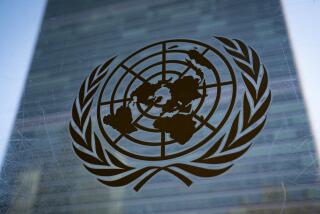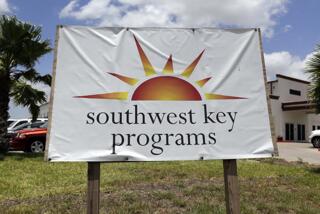Aid Groups Find Rampant Child Sex Abuse
- Share via
NAIROBI, Kenya — The mother of seven children living in a Liberian refugee camp faced a stark choice: Watch her family starve, or let her young daughter be sexually abused by humanitarian aid workers in exchange for the very food rations, medicines and relief supplies sent to save their lives.
Her choice was a matter of survival, she said.
“When the food finishes, my youngest child keeps crying and pulling on my skirt,” the mother said. “What do you think you can do if your daughter brings you some?”
A report released this week by the Office of the U.N. High Commissioner for Refugees revealed that sexual exploitation of children by aid workers had become rampant in many West African refugee camps. Relief workers routinely demanded sex in return for items such as plastic sheeting, bars of soap or a few biscuits.
“The very people who are meant to be providing services are the exploiters themselves,” Jane Gibril, a top official with the Save the Children charity told the British Broadcasting Corp. in Monrovia, Liberia’s war-torn capital.
The London-based charity--which was among the 40 humanitarian aid groups, including the U.N. refugee agency and the U.N. peacekeeping mission in neighboring Sierra Leone, implicated in the scandal--announced that it had fired a staff member and two volunteers for sexually exploiting children.
News of the widespread sexual abuse shook the United Nations, which was recently embarrassed by accusations that peacekeepers under its command in the Balkans were involved in the trafficking of women for international prostitution rings.
On Wednesday, U.N. Secretary-General Kofi Annan ordered “that these allegations be investigated as thoroughly and urgently as possible.” Saying he was “shocked and disturbed” at the report, he pledged to “act forcefully should any of these allegations be confirmed.”
U.N. Children’s Fund director Carol Bellamy said Wednesday that her agency “takes very seriously the findings of the report.” She noted that UNICEF had adopted a zero-tolerance policy toward the sexual abuse of children by its staff, and she urged other U.N. agencies and nongovernmental organizations, or NGOs, to adopt similar policies.
“We are particularly outraged that some humanitarian [aid] workers have betrayed the trust of the children they are charged to assist and protect,” Bellamy said.
Save the Children and the UNHCR teamed up in October to investigate widespread allegations that refugee camps in Guinea, Liberia and Sierra Leone had become cesspools of sexual exploitation targeting children. On Tuesday, the agencies released a report of their initial findings--but only after the BBC broke the story.
The report, which was prepared after interviews with more than 1,500 children and adults, states that “sexual violence and exploitation of children appears to be extensive in the communities visited and involves actors at all levels--U.N. staff, security forces, staff of international and national NGOs, government officials and community leaders.”
“The report indicates that it is a relatively prosperous ‘elite’--including U.N. staff, peacekeepers and NGO workers--whose resources are considerably more than those of the refugees, who exploit this extreme disparity surrounding the refugee population,” the UNHCR and Save the Children said in their summary of the report’s findings.
“Exploiters appear to be able to pay for sex when and with whom they want, and to do so with impunity, since the very people they exploit are not able to complain about their situation for fear of their source of basic survival being removed.”
Investigators recorded allegations against 67 individuals belonging to 40 relief groups. No individuals or groups were identified because a U.N. investigation was continuing, a U.N. spokesman said.
The report is replete with accounts by children who said they were forced to have sex with relief workers to get basic humanitarian aid.
“It’s difficult to escape the trap of those [NGO] people,” the report quotes a “Liberian adolescent” as saying. “They use the food as bait to get you to [have] sex with them.”
Refugee women in Guinea told investigators that “in this community no one can access CSB [a soy nutrient] without having sex first. They say, ‘A kilo for sex.’ ”
“The stories corroborate each other,” Kris Janowski, a spokesman for the U.N. refugee agency in Geneva, said Wednesday. “It adds up to a very sad picture.”
The sex-for-food allegation is the second recent scandal to rock the refugee agency, which is entrusted to provide emergency shelter, food, water and medicine to the world’s uprooted people.
Only last month, U.N. investigators said the refugee agency was partly to blame for a racket in which UNHCR staff members in Nairobi, the Kenyan capital, extorted up to $50 million from thousands of African refugees seeking resettlement in Europe and North America.
“These are two different cases in which corrupt . . . officials were abusing their positions of power,” Janowski said. “‘It shows that a lot more surveillance and a lot more discipline of staff is needed.”
Most of the victims in the sex-for-food cases are girls, but some boys are targeted by female aid workers, the report says.
The victims said some relief workers would withhold services until the children had sex with them. Children who refused to have sex were sent to the back of food lines. Many times, children were told that “your name is not on the list” or that “the computer swallowed your card” when they refused to comply with the demands, according to the report.
Many victims said they didn’t realize they were entitled to food rations and other benefits without conditions.
The refugees subjected to sexual exploitation already endure harsh lives in ramshackle camps. The vast majority survived brutal civil wars in Liberia and Sierra Leone, where soldiers used machetes to hack off the limbs of women and children.
Janowski said the U.N. would adopt new measures--including deploying more female staff--to protect refugees. He said that the agency would discipline any staff member found guilty of sexual exploitation or other wrongdoing but that it was up to West African countries to pursue criminal prosecutions.
“The legal systems in many of these countries are weak, and it is a chore to get law enforcement to do anything,” he said.
Times staff writer William Orme at the United Nations contributed to this report.
More to Read
Sign up for Essential California
The most important California stories and recommendations in your inbox every morning.
You may occasionally receive promotional content from the Los Angeles Times.










